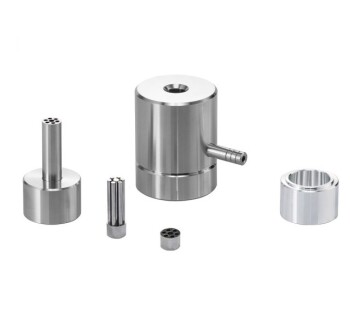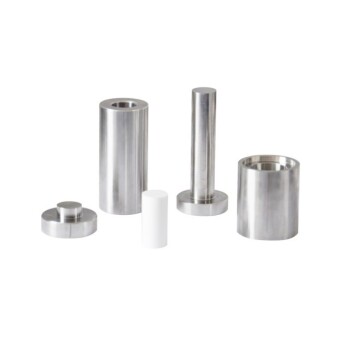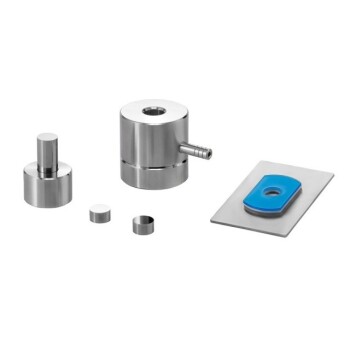At its core, a hydraulic press is an unmatched tool for applying immense, controlled force. Its primary advantages are the ability to deliver massive tonnage and maintain precise control over that force throughout the entire stroke. The main limitations are its slower operational speed compared to mechanical alternatives, higher upfront investment, and the need for regular maintenance of the hydraulic system.
The true value of a hydraulic press lies not just in its brute strength, but in its precise and consistent application of that strength. Understanding this means viewing it as a strategic choice where you trade high-speed cycle times for unparalleled power, control, and versatility.
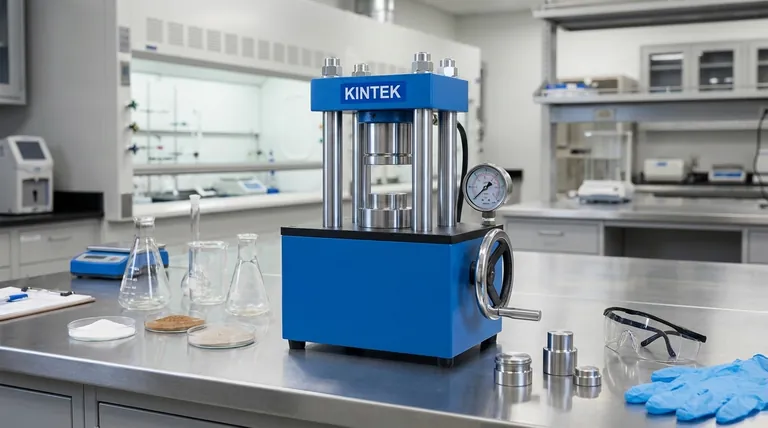
The Core Advantage: Unmatched Force and Precision
A hydraulic press operates on a simple principle—Pascal's law—to achieve extraordinary results. A force applied to a confined fluid is transmitted undiminished throughout the fluid, allowing a small input to be multiplied into an enormous output force.
Delivering Immense Tonnage
The fundamental benefit of a hydraulic press is its ability to generate extremely high force from a relatively compact design. This makes it the go-to solution for heavy-duty tasks.
Applications like forging thick metal billets, stamping large automotive body panels, or compacting powdered materials require forces that other press types simply cannot deliver efficiently.
Full Force Throughout the Stroke
Unlike a mechanical press, which only reaches maximum force at the very bottom of its stroke, a hydraulic press can deliver its full rated force at any point.
This characteristic is critical for operations like deep drawing, where consistent pressure is needed to form a part without tearing it, or for compression molding, which requires sustained pressure as material cures.
Granular Control Over Pressure and Position
Modern hydraulic presses offer sophisticated control over every aspect of the operation. With features like programmable logic controllers (PLCs) and digital interfaces, operators can precisely set the force, speed, stroke distance, and dwell time.
This level of control ensures part consistency, protects expensive dies from damage, and allows for the forming of highly intricate shapes with tight tolerances.
Versatility Across Applications and Materials
The inherent control of a hydraulic press makes it one of the most versatile machines on any shop floor. A single press can be adapted for a wide range of jobs with minimal changeover.
Adaptability Through Simple Adjustments
The force a hydraulic press exerts is a direct function of the fluid pressure. This means an operator can easily dial the tonnage up or down to suit different materials, from delicate plastics and rubber to high-strength aerospace alloys.
This makes it ideal for job shops or R&D labs that handle a variety of tasks, including metal forming, assembly, crimping, shearing, and straightening.
Design Flexibility and Compact Footprint
Because the force is generated by fluid pressure, hydraulic presses can be designed more flexibly and often have a smaller footprint than mechanical presses of equivalent tonnage.
The power unit (motor and pump) can even be located separately from the press frame, offering more options for facility layout.
Integration with Specialized Processes
Hydraulic presses can be easily equipped with heated platens. This enables them to perform thermal processes like compression molding, bonding, and curing, tasks that are impossible on a standard mechanical press.
Understanding the Trade-offs and Limitations
No technology is without its drawbacks. Acknowledging the limitations of hydraulic presses is key to making an informed investment decision.
The Speed-for-Power Compromise
The most significant trade-off is operational speed. Hydraulic presses are generally slower than their mechanical counterparts in terms of strokes per minute.
The time it takes for the hydraulic fluid to flow and build pressure makes them less suitable for high-volume, rapid-fire stamping of simple parts where speed is the primary driver of profitability.
Higher Upfront and Maintenance Costs
Hydraulic systems are complex and require a higher initial investment. Furthermore, they demand a disciplined maintenance schedule.
Regular upkeep involves checking hydraulic fluid levels and quality, inspecting for leaks in hoses and seals, and replacing filters. Neglecting this maintenance can lead to costly downtime and component failure.
The Risk of Hydraulic Fluid Leaks
While a well-maintained system is reliable, the potential for fluid leaks is an inherent risk. A leak can be a safety hazard, create an environmental issue, and result in machine downtime for repairs.
Making the Right Choice for Your Application
Selecting the right press requires a clear understanding of your primary production goal.
- If your primary focus is high-volume production of simple parts: The slower cycle time of a hydraulic press may be a significant bottleneck; a mechanical press is likely a better fit.
- If your primary focus is forming complex shapes or deep drawing: A hydraulic press is the superior choice due to its consistent force delivery throughout the entire stroke.
- If your primary focus is versatility for R&D or varied job shop work: A hydraulic press is ideal because its force, speed, and stroke are easily adjusted for different tasks.
- If your primary focus is applying extreme force for forging or compaction: A hydraulic press is the undisputed leader in delivering the massive, controlled tonnage required for these jobs.
Ultimately, choosing a hydraulic press is a strategic decision to prioritize power and control over raw cycle speed.
Summary Table:
| Aspect | Advantages | Limitations |
|---|---|---|
| Force | Delivers immense tonnage and full force throughout stroke | Slower operational speed compared to mechanical presses |
| Control | Granular control over pressure, speed, and position | Higher upfront investment and maintenance costs |
| Versatility | Adaptable for various materials and processes like forming and molding | Risk of hydraulic fluid leaks and environmental concerns |
| Applications | Ideal for forging, deep drawing, R&D, and job shop work | Less suitable for high-volume, rapid-fire production |
Ready to enhance your laboratory's capabilities with a hydraulic press? KINTEK specializes in lab press machines, including automatic lab presses, isostatic presses, and heated lab presses, designed to deliver precise force and control for your specific needs. Whether you're in R&D, material testing, or production, our equipment ensures reliability and efficiency. Contact us today to discuss how we can support your projects and provide tailored solutions that maximize your lab's performance!
Visual Guide
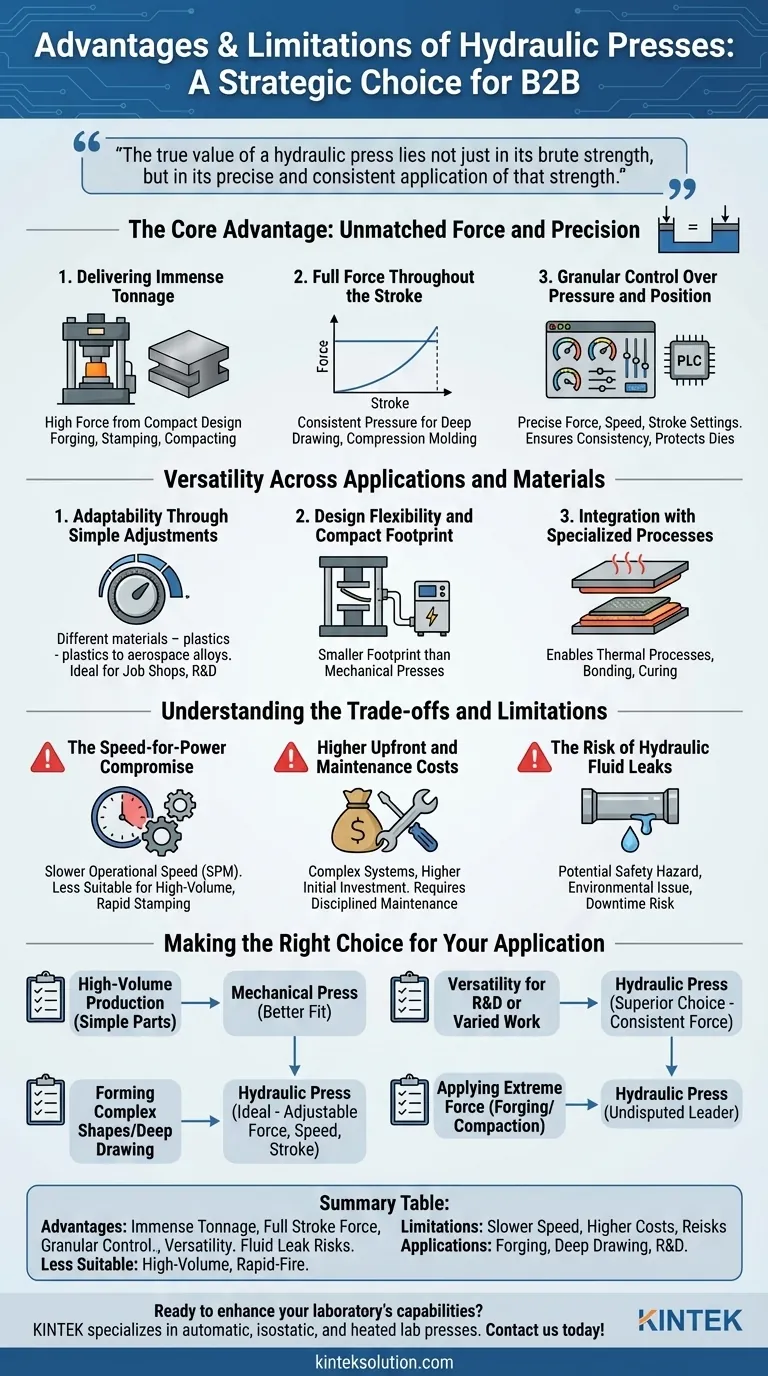
Related Products
- Laboratory Hydraulic Press 2T Lab Pellet Press for KBR FTIR
- Automatic Laboratory Hydraulic Press Lab Pellet Press Machine
- Laboratory Hydraulic Press Lab Pellet Press Button Battery Press
- Automatic Laboratory Hydraulic Press for XRF and KBR Pellet Pressing
- Manual Heated Hydraulic Lab Press with Integrated Hot Plates Hydraulic Press Machine
People Also Ask
- How are hydraulic presses used in spectroscopy and compositional determination? Enhance Accuracy in FTIR and XRF Analysis
- What are some laboratory applications of hydraulic presses? Boost Precision in Sample Prep and Testing
- What role does a high-pressure laboratory hydraulic press play in KBr pellet preparation? Optimize FTIR Accuracy
- How is a laboratory hydraulic press used for polymer melt crystallization? Achieve Flawless Sample Standardization
- Why is sample uniformity critical when using a laboratory hydraulic press for humic acid KBr pellets? Achieve FTIR Accuracy

















